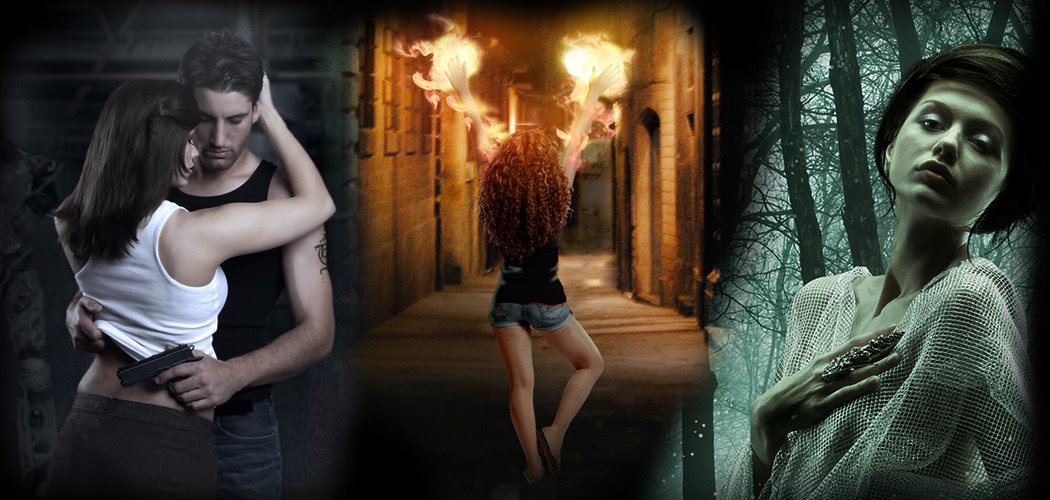
Mold, like black flowers blossoming across the embossed Victorian wallcovering, greets me with the smell of ancient mildew long since dried as I pass the threshold into my childhood home. Even oyster fungi have lived and died along the edges of grayed doorframes, their remnants brown crumbs like dirt gathered in the corners of the room. The years since my departure for boarding school—or what I fondly call my escape—wait here, each layer of stain an accusation of my neglect.
I hear Cora’s tap, tap, tap on the broken marble floor, though she hasn’t come to greet me. We had agreed to meet at our old digs, as she likes to call Tomwell Manor.
I meander from the foyer to the receiving room. A once impressive staircase with iron spiral bars—now rusted red—awaits, the stairs either missing or sunken and twisted. The old wood flooring, once polished to honey amber, once strong and echoing the clicking percussion of Cora’s steps, now evoked nothing but thuds and creaking under my feet. I doubt Cora would suffer her delicate limbs creating such dull beats.
I stride past the red velvet couches, threadbare and faded to salmon, and inch around the square granite coffee table, upon which I had teethed, and reach for the old, baby grand. For the first time since arriving, I feel a pang of regret. I had been the sole performer in a house of recluses.
“The piano was never tuned. Do you remember?” Cora says. I can tell from the echo of her voice that she is yet outside the circle, hovering just beyond the doorway leading to the north wing.
I withdraw my hand from the piano’s mottled ivories and its chipped black lacquer. “I remember.”
“Ack. This old house. How it wheezes. Remember how you sneezed every single day, just as soon as the sun breached the bridal veils?” She sighs. I hear the rustle of her dress as she shudders before darting past the doorway. “Your father insisted it was psychosomatic—a glimpse of dust upon the sunlight and you sneezed so very loudly. I nearly jumped out of my skin each time.”
The receiving room is an impressive circle with a hearth facing north on the far south wall. People nowadays would call it a family room. Our musty couches remain in the center, and their gold-plated end tables hold a set of pink hurricane lamps, open at the top with bodies covered in roses, hand-painted in occupied Japan.
Wood paneled hallways encircle the receiving room and lead outward like arms and legs reaching and stretching. The home has four wings. And the stairs lead to a once beautiful sunroom and an attic alongside it. My gaze floats to the summit of the stairs.
“Have you seen my paints? I should like to take them with me.” My eyes stray to the fogged window separating the west and south wings, and I wonder how sturdy the porch is and if I might set up my easel there. Just for the day.
“The attic, I think. You always painted best in the attic. The sun gave you such headaches. Do you remember?”
“Of course, I do,” I say with a bite. Does she think I’ve forgotten everything? Perhaps she is worried not about what I have forgotten, but what I remember. “It wasn’t that long ago—certainly not for you, Cora.”
Cora. The woman who emerged from the hurricane, crossing the threshold of my parents’ home with buckets of water behind her, soaking the marble. She’d slipped and twisted one of her slender ankles—one of two she’d actually shown my father that night before pulling her skirt down past her ankles in belated modesty. In seduction, I understood later, when I was old enough to understand such things.
Mother’s illness followed. Then Father’s grief. He grew old quickly.
Cora never ages.
I don’t like to think about how impressionable I was during those confusing years, or Cora’s deceitful ways, or any of her illusions, really. I don’t think she can help herself, being what she is, and therefore any resentment only hurts me. I’ve spent years filling those holes in my heart. I have no intention of probing them again.
Instead, I manage the stairs and find my oils in the attic. Such paint can last centuries they say. I find my old canvases in the sunroom’s closet, several still in wedges and vices. I free them from such pressures and gather them, tucking them under my arm.
Travel down the stairs is not as easy as my climb up, but I manage. Cora’s spindly shadow stretches across the floor below. Framing her dark form, the shadows of thin leaves flicker from black to merely a darkened shade of the rug’s muted pastels. This gives the appearance of motion, as if the rug is a pond in a thunderstorm, its calm surface shattered by hail.
Cora moves like this, flitting through doorways, causing a rustling while weaving her designs. Plotting her next moves. Meticulous in her control. She’d always lurked in the shadows, especially when Mother lay dying. Cora never quite came around to resting by the hearth. She’d always stuck to the wings or moved in circles around and around the receiving room, on the edge of our lives.
Cora’s shadow recedes as I reach the bottom of the stairs. I turn my back toward her and set my paints on the granite coffee table; then I sit at the edge of the closest couch.
“You can come out, you know,” I tell her. “I’ve seen you so before. Remember?” I use the word like a retaliation.
“I remember,” she responds in kind, like this is a special game we play, one of words and memories. “But I am… I am afraid of your stare.”
I snort softly. Such honesty. But I never really know if she is being honest or not. I suppose offering maybe a half-truth is safe for her, less of a lie to cover a bigger deceit. “I’ll keep my gaze low. Promise.”
“I have taken care of Raul.”
Her confession is so blunt, I almost look up, but I catch myself and stare at the blue metal of my paint box. The trembling starts in my feet first, then my hands.
“He will not bother you any longer, my darling.”
I only nod through my strange pain—a tangle of emotions fighting each other for dominance—and her words hit me hard. I notice my cheeks are wet only by the tickle of teardrops clinging to my chin.
“He has never been good for you.”
“So you said.” I rest my chin on my chest, feeling my limbs and torso deflate into that awkward body of mine at fifteen. Nothing was ever good for me back then.
“The child wasn’t his.” Cora states this as a fact.
“Not for lack of trying,” I retort.
“I knew it wasn’t Raul’s.” She continues as if I hadn’t said anything. “He couldn’t have given any woman what she wanted. He is… incapable. That is the price for eternity, eventually.”
Inwardly, I sneer, summoning anger for the man I had loved with a schoolgirl’s naivety. He’d professed the same, only to discard me as a mistake. I could have known better about the true nature of men like him, if I hadn’t been so sheltered—No! So trapped.
“If you knew, why did you do it?” I bite out.
“Because I loved him.”
I gasp.
“And because I took someone from you.”
Does she mean Mother? Or does she mean Father? I know her regret is somewhat sincere, in her crafty way. I decide I will accept it, just to free her. And maybe to free me of her. As soon as the thought enters my mind, I glimpse the void left by her sudden absence. The thought of never again having her in my life sends a streak of fear down my spine—not relief as I would expect. I frown.
“I care for you… like a daughter,” Cora adds like an explanation of all her past choices.
Saying that out loud does not make it so. “I must thank you, I suppose,” I say coolly. “You could have smothered me in my sleep.”
She laughs. “Never, my darling.”
“Well, you smothered me… but in different ways, didn’t you?”
Cora does not answer. She withdraws into the shadows, her toes clicking on the marble that surrounds the wood-paneled room with its rustic stone hearth.
I refuse to feel guilty for wounding her. I flip open the top of my blue metal artist box, which looks more like one of those lunchboxes all men used at the beginning of the twentieth century, men on construction sites, building the high-rises of New York, their feet dangling over the edge of a steel beam, sandwich in hand, lunchbox beside them. Raul had watched the Empire State Building being built.
“It is a game,” I whisper to myself. “She is playing me, as always.” She hasn’t any true feelings, really.
I unscrew the cap from the tube of yellow ochre, and I sniff it and blink. The smell is old and thick and warm. It smells like days in my attic. It smells like dead bats and dust and teeth.
I laugh out loud at that thought. “Remember the time we found Admiral Tomwell’s wooden teeth in that red cigar box?” I snort. “I wonder how they ever got there.”
“He was a charming man,” Cora offers, “when he wasn’t displaying his injuries or regaling our guest with war stories from the revolution or, worse, shooting at the fresco ceiling. Too much drinking. In the end, too much gambling. Unfortunate choices. Unfortunate end.”
“I bet,” I mutter.
“I’ve always protected those I love, darling,” Cora’s voice echoes from the foyer. “But gambling seduces that sinner whose punishment I must acquiesce to fate.” The door moans open like a ghost then closes firmly.
The house falls silent. Startled by the quiet, I look up. Thin white fibers stretch across every doorframe of the room, sealing me in like I am some fragile parcel wrapped in cellophane.
Cora’s spider legs have crafted me a nice prison. But that is Cora’s way. That is her protective nature. Smothering. I lean back against the old couch, alone with my thoughts until the memory of Raul joins me. I grasp my shoulders and rock through my grief before I dare unravel her latest game made for me.
With the setting sun filtering amber rays through the south wing’s doorway behind me, I lift my brush and begin to paint across the thin white fibers.
This will take some time.
*****
“Charleston Twisted” is another story in Cora’s Universe, and it is available on my website and on Wattpad. –Kara



